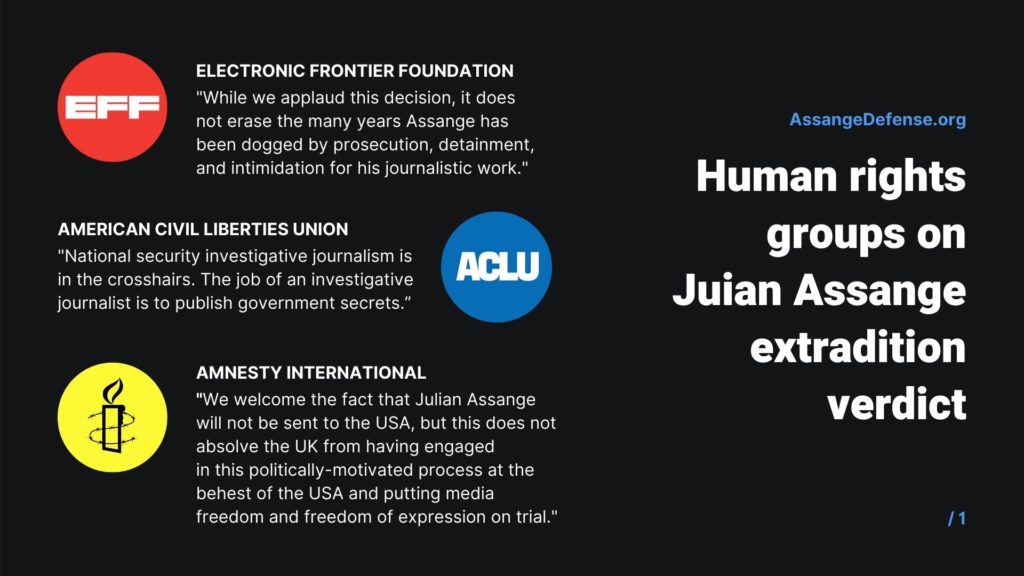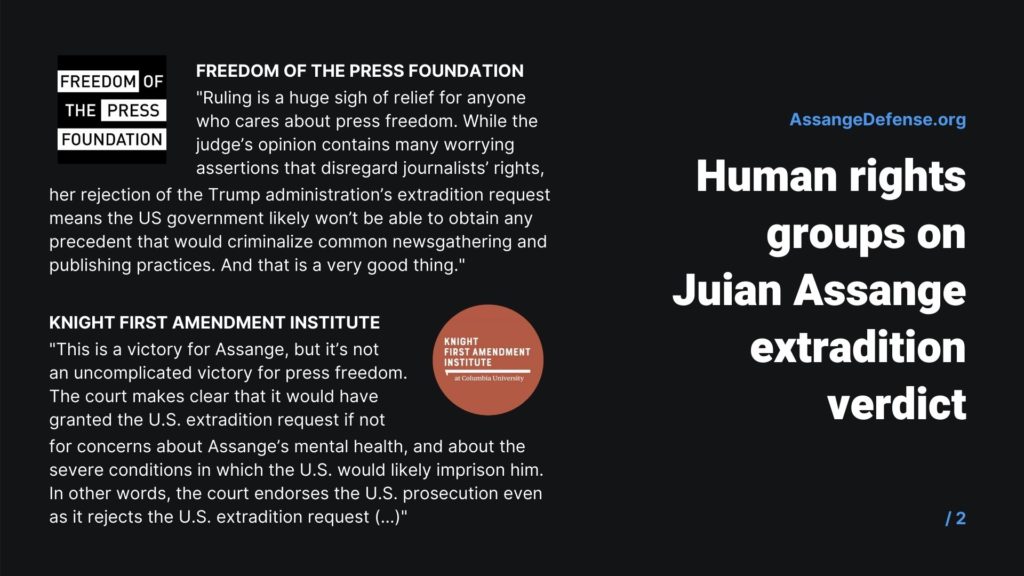
| Sources Directory A to Z Index Topic Index |
RSS |
Media Resources
Subject IndexNews Releases
Submit a news release or event
Media Directory
Sources Library
Sources Bookshelf
Sources Newsstand
Journalism News
Media Industry
Digital World
Sources HotLink
Include yourself in SOURCES
FAQ
Download PDFs
Connexions
Alternative Media
Radical Digressions
Contact
To submit a news release, use this form.
Rights groups react to Assange verdict
January 12, 2021
Press freedom, human rights, free speech, and digital privacy organizations have been sounding the alarm over the prosecution and attempted extradition of WikiLeaks founder Julian Assange ever since his arrest in April 2019. Now a district court judge in London has ruled against extraditing him from the United Kingdom to the United States purely on medical grounds, while accepting nearly all of the U.S.’s dangerous arguments that would criminalize basic journalistic activity – the very arguments these rights groups have warned about. Just two days later, the same judge denied bail for Assange, so he remains in British custody as the U.S. appeals the verdict.
Amnesty International
On the extradition ruling:
We welcome the fact that Julian Assange will not be sent to the USA, but this does not absolve the UK from having engaged in this politically-motivated process at the behest of the USA and putting media freedom and freedom of expression on trial.
On the subsequent denial of bail for Assange:
“Today’s decision to refuse Julian Assange’s bail application renders his ongoing detention ‘arbitrary’, and compounds the fact that he has endured punishing conditions in high security detention at Belmarsh prison for more than a year,” said Nils Muiznieks, Amnesty International’s Europe Director.
“Rather than finally going home with his loved ones and sleeping in his own bed for the first time in almost ten years, Julian Assange will be driven back to his solitary cell in a high security prison.”
Knight First Amendment Institute of Columbia
Jameel Jaffer, Executive Director:
“This is a victory for Assange, but it’s not an uncomplicated victory for press freedom. The court makes clear that it would have granted the U.S. extradition request if not for concerns about Assange’s mental health, and about the severe conditions in which the U.S. would likely imprison him. In other words, the court endorses the U.S. prosecution even as it rejects the U.S. extradition request. The result is that the U.S. indictment of Assange will continue to cast a dark shadow over investigative journalism. Of particular concern are the indictment’s counts that focus on pure publication – the counts that charge Assange with having violated the Espionage Act merely by publishing classified secrets. Those counts are an unprecedented attack on press freedom, one calculated to deter journalists and publishers from exercising rights that the First Amendment should be understood to protect.”
Freedom of the Press Foundation
Executive director Trevor Timm:
Today’s ruling is a huge sigh of relief for anyone who cares about press freedom. While the judge’s opinion contains many worrying assertions that disregard journalists’ rights, her rejection of the Trump administration’s extradition request means the US government likely won’t be able to obtain any precedent that would criminalize common newsgathering and publishing practices. And that is a very good thing.
American Civil Liberties Union
Ben Wizner, director of the speech, privacy and technology project:
“National security investigative journalism in the crosshairs. The job of an investigative journalist is to publish government secrets,” Ben Wizner, the director of the speech, privacy and technology project at the American Civil Liberties Union, said.
“I think what hasn’t gotten enough attention is this idea that the US secrecy laws can bind foreign journalists and publishers,” Wizner added. “That’s a very, very dangerous precedent. I hope that this court’s decision on the charges doesn’t become the decision that people look to in future cases.”
Electronic Frontier Foundation
Executive Director Cindy Cohn:
“We are relieved that District Judge Vanessa Baraitser made the right decision to reject extradition of Mr. Assange and, despite the U.S. government’s initial statement, we hope that the U.S. does not appeal that decision. The UK court decision means that Assange will not face charges in the United States, which could have set dangerous precedent in two ways. First, it could call into question many of the journalistic practices that writers at the New York Times, the Washington Post, Fox News, and other publications engage in every day to ensure that the American people stay informed about the operations of their government. Investigative journalism – including seeking, analyzing and publishing leaked government documents, especially those revealing abuses – has a vital role in holding the U.S. government to account. It is, and must remain, strongly protected by the First Amendment. Second, the prosecution, and the judge’s decision, embraces a theory of computer crime that is overly broad – essentially criminalizing a journalist for discussing and offering help with basic computer activities like use of rainbow tables and scripts based on wget, that are regularly used in computer security and elsewhere.
While we applaud this decision, it does not erase the many years Assange has been dogged by prosecution, detainment, and intimidation for his journalistic work. It also does not erase the government’s arguments that, as in so many other cases, attempts to cast a criminal pall over routine actions because they were done with a computer. We are still reviewing the judge’s opinion and expect to have additional thoughts once we’ve completed our analysis.”
For more information:
Assange Defense – assangedefense.org


